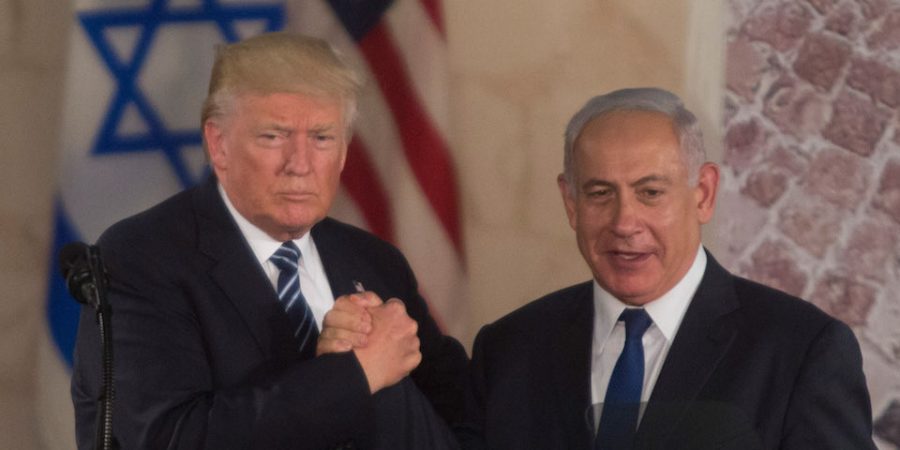NEWS ANALYSIS: Trump’s Middle-East Policy Bringing Changes to the Region
President Donald Trump and Israel’s Prime Minister Benjamin Netanyahu.
The first year of President Donald Trump’s presidency has proved to be an interesting one. Riots, economic recovery, Twitter posts, and close calls with an Eastern autocrat essentially sums up 2017 rather succinctly.
The previous year was full of changes in the status quo under the Trump presidency, and that is true of the United States’ involvement in the Middle East as there have been some drastic changes taking place in that region ranging from Russian involvement in Syria to Trump recognizing Jerusalem as Israel’s capital to ISIS being reduced to a mere shell of its former threatening self.
It seems that this region of the world is being dragged into 2018 as a radically different place. However, how much of this is because of Trump?
The biggest surprise to come out from the Middle East in late 2017 was the defeat of ISIS, or at least something close to it. Folks on the right and center are saying that Trump completely “demolished” ISIS and did more to bring them down in his first year than former President Barack Obama did in the last two to three years of his presidency. Trump’s policy regarding Israel has been regarded positively by those in the Western world for the most part. The truth is, however, that ISIS was on its way out from the get-go of the Trump presidency and his administration barely did much more compared to Obama.
The Islamic State has been a problem since 2014, killing thousands of civilians, beheading journalists on camera, laying waste to the regions they conquered, causing mass unrest and death across the world, and being the main cause of the Syrian migrant crisis. For three years ISIS has been causing chaos, and now they have been unceremoniously defeated.
At its height, the Islamic State, controlled territory from the tip of Baghdad to Raqqa in late 2014, but October of 2017, ISIS barely controlled the border regions of Iraq and Syria. ISIS is not out of the fight, but for the most part, it is on the brink of near collapse.
Trump is taking the credit for this victory, but what is unclear is how much of it belongs to him and the U.S. as a whole. While it is true that the US-led coalition (which mostly consists of bombing, drone strikes, supplies, and some volunteer fighters) provided much help under the Trump administration, the execution of the plan was just a continuation of Obama’s campaign in the region, which was, incidentally, not an overwhelming success.
The U.S.-led coalition did have success in the battles with ISIS at Fallujah and Tikrit, although the fall of ISIS in Raqqa under the Trump administration was a much bigger deal since it was the last major ISIS stronghold in Syria.
American and Western intervention aside, the real heroes of the war against ISIS are the people who actually fought it: mainly the Iraqis, Syrians, and the Russians along with Iranian and Kurdish forces. The Russian’s close ties with the Syrian Assad regime did more to help bring ISIS down than the West did since the Russians supported the Syrian government in the civil war.
The soldiers and militia fighters from the region did pretty much all of the heavy lifting and capturing of territory at the cost of their own lives and destruction of their homes. While American aid did help the effort in this past year, the battles were “won” with Syrian and Iraqi blood.
One aspect of the U.S. Middle East policy that Trump can take sole credit for is the furor caused in that region by the U.S. recognizing Jerusalem as Israel’s capital. Trump’s actions in Israel have been notable and controversial; that’s not surprising. However, declaring Jerusalem to be the capital of Israel in a region that hates the Israel might be a bridge too far, even for Trump.
Trump’s move is designed to reinforce that he is incredibly supportive of Israel, and polls conducted In Israel show that Israelis prefer Trump over previous Presidents Obama and George W. Bush. But recognizing Jerusalem as Israel’s capital was a sharp stick in the eye to the other Middle Eastern nations and seems counter-productive to the U.S.’s stated intent to bring stability to the reason.
Dealing with Iran and the ongoing effort to settle things with the Palestinian state are the biggest concerns on the president’s plate, but it looks like Israel will be taken care of, as usual. The hope is that nothing ends up worse.









